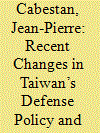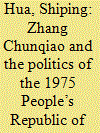|
|
|
Sort Order |
|
|
|
Items / Page
|
|
|
|
|
|
|
| Srl | Item |
| 1 |
ID:
135760


|
|
|
|
|
| Summary/Abstract |
In mainstream political science literature, two main theoretical perspectives on the origins of political trust predominate: institutional theory which argues that political trust is generated from democratic institutions and cultural theory which argues that political trust is rooted in historical-cultural factors such as social trust. However, the influence of other social values, such as authoritarian orientations, has received little attention in the extant literature. This article investigates the determinants of political trust in 13 East Asian societies with a special emphasis on authoritarian orientations. The evidence from our empirical study suggests that authoritarian orientations are an independent cultural source of political trust in these societies.
|
|
|
|
|
|
|
|
|
|
|
|
|
|
|
|
| 2 |
ID:
135761


|
|
|
|
|
| Summary/Abstract |
In spite of John Mearsheimer (and others)’s dire prediction, Taiwan still believes that, rather than having to negotiate like Hong Kong a level of autonomy acceptable to Beijing, it can remain de facto independent as long as it is able to keep a credible conventional deterrence and a strong security relationship with Washington. The recent changes in Taiwan’s defense policy as well as in Taiwan-USA relations tend to confirm that belief and willingness. However, the island is facing growing security challenges that will not be easy to fix. And overcoming these challenges will depend much more upon the Taiwanese’s resolve than the USA’s intention to remain committed to the island’s security.
|
|
|
|
|
|
|
|
|
|
|
|
|
|
|
|
| 3 |
ID:
135757


|
|
|
|
|
| Summary/Abstract |
This article begins with an analysis of small-firm economies in Italy and China and then compares and contrasts the migrations of Italian peasants and Wenzhou Chinese to Prato, a historic center of textile production in northern Italy. The purpose of our analysis is not to argue that, despite many differences, the rural to urban migration of Italian peasants and the international migration of Wenzhou Chinese are fundamentally the same. Instead, through an analysis of similarities and differences into the organizational nature of these two migrations, we can better understand the crucial historical differences between the two cases, differences that give us insight into the more complex questions about the place of Italian and Chinese family firms in the global economy of the twenty-first century.
|
|
|
|
|
|
|
|
|
|
|
|
|
|
|
|
| 4 |
ID:
135759


|
|
|
|
|
| Summary/Abstract |
This study examines the two contending theories of racial issues or ethnic politics, namely, the “contact” and “group threat” theories, in an attempt to learn how increased exposure to and contact with China affect Taiwanese people’s perceptions of China. More explicitly, faced with China’s rising power and changes in cross-Strait relations, the attitudes and sentiments of the general public in Taiwan could either become friendlier or more hostile to China. This study employs a randomized telephone survey, and statistical analysis of the data has allowed us to identify a clear trend of increased exposure leading to more positive opinions of China, confirming the contact theory. Furthermore, these positive impressions have encouraged the very same people to display a willingness to continue interactions with China. This phenomenon understates the unchanging reality that close economic ties between the two sides have overcome, at least to some degree, the sense of hostility across the Taiwan Strait.
|
|
|
|
|
|
|
|
|
|
|
|
|
|
|
|
| 5 |
ID:
135758


|
|
|
|
|
| Summary/Abstract |
Existing studies about the 1975 constitution in the English literature, mostly conducted shortly after its announcement, are primarily interested in how the document differs from the constitutions of 1954 and 1978. The current study is instead primarily interested in the dynamics and process of drafting the 1975 constitution. Although the document reflects the radicalism of the Cultural Revolution, it was also the result of political compromise. The roles of Mao and the party, the concept of “dictatorship of the proletariat,” and the belief in communist internationalism were all toned down because of the preceding events that occurred. The fate of the 1975 People’s Republic of China constitution was closely linked to Zhang Chunqiao, the key person in charge of drafting the document. Although many of Zhang’s ideas as reflected in the 1975 constitution were communistic, the way that the politics was conducted then was not. Unlike the more commonly used method of textual analysis from a comparative perspective, this study used materials that emerged after the Cultural Revolution to document the dynamics of drafting the constitution.
|
|
|
|
|
|
|
|
|
|
|
|
|
|
|
|
|
|
|
|
|